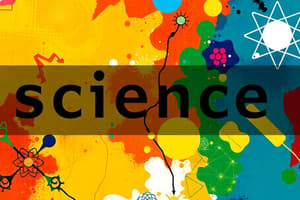Podcast
Questions and Answers
What is the primary focus of natural sciences?
What is the primary focus of natural sciences?
Natural sciences focus on the physical world and its phenomena.
What are the three main branches of science?
What are the three main branches of science?
Natural sciences, formal sciences, and social sciences.
Define the scientific method in brief.
Define the scientific method in brief.
The scientific method is a systematic approach to inquiry involving observation, question formulation, hypothesis testing, experimentation, analysis, and communication of results.
What is the difference between a scientific theory and a law?
What is the difference between a scientific theory and a law?
What role does peer review play in science?
What role does peer review play in science?
List one importance of science related to public policy.
List one importance of science related to public policy.
What is a variable in the context of experimentation?
What is a variable in the context of experimentation?
Give an example of a formal science.
Give an example of a formal science.
Flashcards are hidden until you start studying
Study Notes
Definition of Science
- Systematic enterprise that builds and organizes knowledge in the form of testable explanations and predictions about the universe.
Branches of Science
-
Natural Sciences
- Focus on the physical world and its phenomena.
- Subdivided into:
- Physics: Study of matter, energy, and their interactions.
- Chemistry: Study of substances, their properties, and reactions.
- Biology: Study of living organisms and their interactions with the environment.
-
Formal Sciences
- Study of abstract concepts and systems.
- Includes:
- Mathematics: Study of numbers, quantities, and shapes.
- Logic: Study of reasoning and argumentation.
- Statistics: Study of data analysis and interpretation.
-
Social Sciences
- Study of human behavior and societies.
- Includes:
- Psychology: Study of mind and behavior.
- Sociology: Study of social behavior and structures.
- Economics: Study of production, distribution, and consumption of goods.
Scientific Method
- Systematic approach to inquiry:
- Observation: Gathering data about a phenomenon.
- Question: Formulating questions based on observations.
- Hypothesis: Proposing a testable explanation.
- Experimentation: Conducting experiments to test hypotheses.
- Analysis: Analyzing data collected during experiments.
- Conclusion: Drawing conclusions and refining hypotheses if necessary.
- Communication: Sharing results with the scientific community.
Key Concepts
- Theory: Well-substantiated explanation of some aspect of the natural world.
- Law: Statement based on repeated experimental observations that describes some phenomenon of nature.
- Variable: Any factor that can change in an experiment; includes independent, dependent, and controlled variables.
- Peer Review: Evaluation of research by experts in the field to ensure validity and reliability.
Importance of Science
- Expands knowledge and understanding of the universe.
- Provides technological advancements and innovations.
- Informs public policy and decision-making through evidence-based approaches.
- Aids in addressing global challenges such as climate change, health crises, and resource management.
Definition of Science
- Science builds and organizes knowledge through testable explanations and predictions about the universe.
Branches of Science
- Natural Sciences focus on the physical world and its phenomena.
- Physics studies matter, energy, and their interactions.
- Chemistry studies substances, their properties, and reactions.
- Biology studies living organisms and their interactions with the environment.
- Formal Sciences study abstract concepts and systems.
- Mathematics studies numbers, quantities, and shapes.
- Logic studies reasoning and argumentation.
- Statistics studies data analysis and interpretation.
- Social Sciences study human behavior and societies.
- Psychology studies the mind and behavior.
- Sociology studies social behavior and structures.
- Economics studies the production, distribution, and consumption of goods.
Scientific Method
- The scientific method is a systematic approach to inquiry.
- Observation: Gathering data about a phenomenon.
- Question: Formulating questions based on observations.
- Hypothesis: Proposing a testable explanation.
- Experimentation: Conducting experiments to test hypotheses.
- Analysis: Analyzing data collected during experiments.
- Conclusion: Drawing conclusions and refining hypotheses if necessary.
- Communication: Sharing results with the scientific community.
Key Concepts
- Theory: A well-substantiated explanation of some aspect of the natural world based on evidence.
- Law: A statement based on repeated experimental observations describing a phenomenon of nature.
- Variable: Any factor that can change in an experiment.
- Independent variables are manipulated by the researcher.
- Dependent variables are measured in response to changes in the independent variable.
- Controlled variables are kept constant throughout the experiment.
- Peer Review: Evaluation of research by experts in the field to ensure validity and reliability.
Importance of Science
- Science expands knowledge and understanding of the universe.
- Science provides technological advancements and innovations.
- Science informs public policy and decision-making through evidence-based approaches.
- Science aids in addressing global challenges such as climate change, health crises, and resource management.
Studying That Suits You
Use AI to generate personalized quizzes and flashcards to suit your learning preferences.




